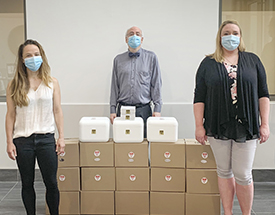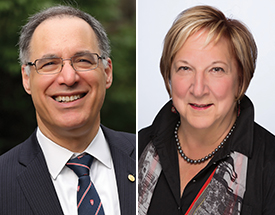Fil d'Ariane
- Accueil /
- À propos de nous /
- Rapports annuels /
- Rapport Annuel 2020 /
- Rapport Annuel 2020 /
- Catalyseurs de la médecine personnalisée

RAPPORT ANNUEL IR-CUSM 2020
null Catalyseurs de la médecine personnalisée
Au fil de l’histoire, les médecins ont envisagé une variété de facteurs individuels pour déterminer la manière de traiter les maladies. De nouvelles découvertes, technologies et approches ont toutefois révolutionné la médecine personnalisée et les scientifiques à l’Institut de recherche du Centre universitaire de santé McGill (IR-CUSM) sont à l’avant-garde de cette révolution. Leurs recherches permettent une compréhension plus approfondie de nos corps uniques et de la meilleure façon de nous maintenir en santé.
Découvrez pourquoi nos chercheurs sont déterminés à stimuler la médecine personnalisée dans ce petit échantillon de leur travail.
- Assurer la mobilité : la « hanche-mobile »
- Introduire notre soi microbien
- Exploiter la capacité inépuisable des biopsies liquides
- Étudier les profils génétiques des patients atteints du cancer
ASSURER LA MOBILITÉ : LA « HANCHE-MOBILE »
Les fractures de la hanche chez les patients âgés engendrent une perte de mobilité qui affecte leur santé et leur bien-être. La Dre Suzanne Morin, du Programme de recherche en désordres métaboliques et leurs complications, est déterminée à trouver de nouvelles manières d’assurer la réhabilitation des patients et d’éviter une deuxième fracture. Son équipe et elle ont développé et testent actuellement une nouvelle technologie de réhabilitation; la «hanche-mobile », une « semelle intelligente » que les patients placent dans leur chaussure. Les patients acceptant de participer à un projet de réhabilitation prolongé reçoivent d’abord une formation et sont suivis pendant huit mois par l’entremise de la semelle intelligente, qui communique avec une tablette grâce à Bluetooth. Ces résultats sont liés au laboratoire de la Dre Morin, ce qui lui permet ainsi de suivre la fréquence et la qualité de la réhabilitation du patient et d’ajuster le programme en conséquence.
« Cette approche fournit aux patients un programme de réhabilitation personnalisé à distance. Ils peuvent ainsi demeurer dans le confort de leur foyer et recevoir un accompagnement simple grâce au programme sur leur tablette », dit la Dre Morin. « L’utilisation de nouvelles technologies pour les personnes très âgées pose inévitablement quelques défis, mais des personnes âgées de 98 ans ont réussi à compléter le programme. »
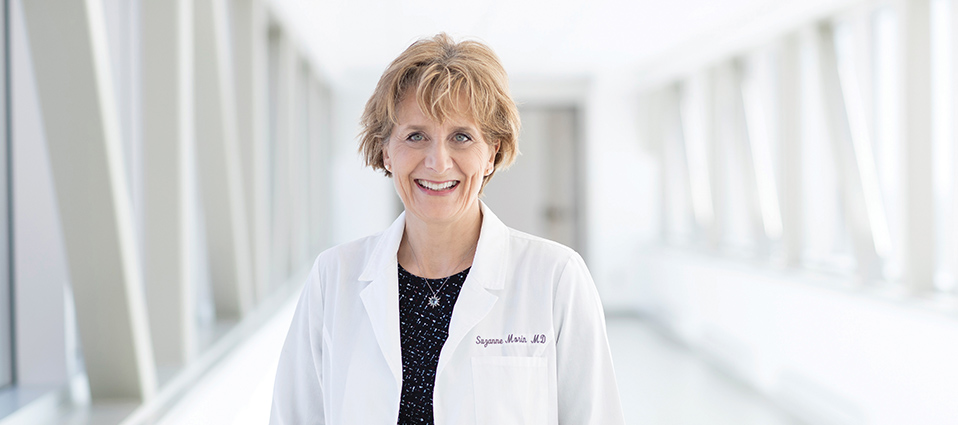
Les petites différences peuvent entraîner de grands changements
L’étude prolongée de la Dre Morin fournit également d’autres indications. « Au fur et à mesure que les patients deviennent plus mobiles, leur perception de leur santé et de leurs habiletés change concrètement. Par conséquent, en plus de fournir une réhabilitation, nous acquérons de l’information sur leur force et leur mobilité générales, et même leur humeur, dit-elle. Nous voulons que cette approche mène à de meilleurs résultats cliniques puisqu’en vieillissant, même les petites différences peuvent entraîner de grands changements dans notre capacité à faire les choses que nous aimons. »
INTRODUIRE NOTRE SOI MICROBIEN
Votre microbiome, soit l’accumulation de microbes vivant à l’intérieur ainsi que sur votre corps, forme votre unique « soi microbien ». Plus nous en savons sur ce soi, meilleure sera notre compréhension de certains problèmes de santé.
« Ce microbiome peut être bénéfique ou néfaste pour la santé humaine, selon sa composition », dit Irah King (Ph. D.) du Programme de recherche translationnelle sur les maladies respiratoires. « Il peut vous prédisposer à une condition qui peut être dictée par une différence génétique, ou vous pouvez avoir une prédisposition génétique qui pourrait altérer le microbiome et ainsi mener à un état de santé différent. »
La recherche d’Irah King aborde la manière dont le microbiome affecte le système immunitaire et comment cela peut être lié à des maladies auto-immunes comme le psoriasis, la maladie inflammatoire chronique de l’intestin ou même les maladies respiratoires. « Le tube digestif possède le plus grand nombre d’espèces microbiennes et le plus grand nombre de cellules immunitaires, créant ainsi une relation intime entre les deux. Le microbiome peut influencer le système immunitaire, qui peut à son tour influencer la maladie, dit-il. Nous cherchons à comprendre comment un traitement donné interagira avec votre soi génétique et votre soi microbien. »
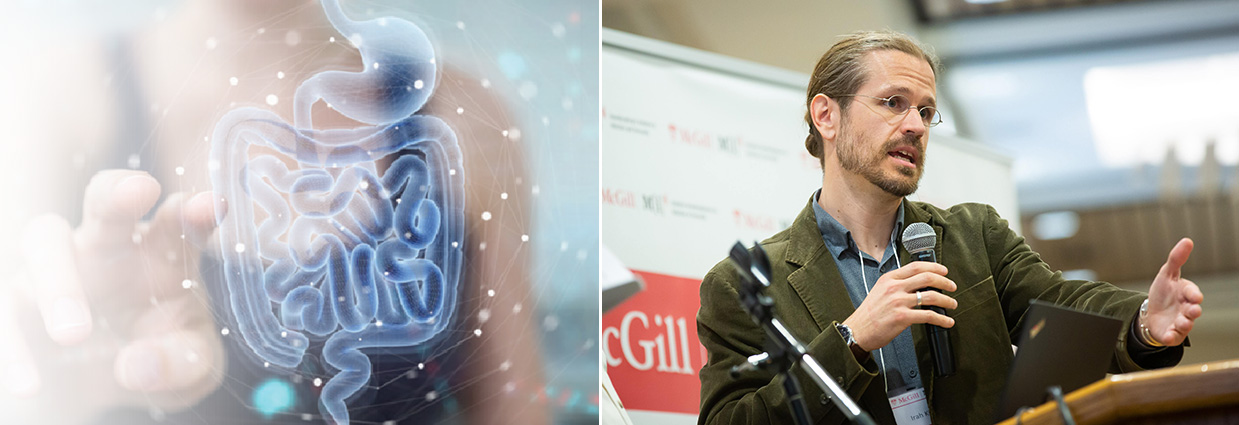
Pourquoi une plateforme de recherche gnotobiotique?
Irah King est le directeur de la nouvelle Plateforme de recherche gnotobiotique de l’IR-CUSM, une ressource en matière d’étude des modèles animaux, en particulier les souris, qui possèdent une constitution génétique identique et qui n’ont soit aucun microbe, soit une composition microbienne contrôlée connue. La plateforme, qui sera lancée dans l’année à venir, permettra aux chercheurs de contrôler et d’évaluer la relation entre la génétique et les microbiomes. « Nous pourrons manipuler le microbiote pendant que tout le reste demeure tel quel, dit-il. Nous pourrons ensuite nous concentrer sur la causalité plutôt que de simplement identifier une corrélation. »
EXPLOITER LA CAPACITÉ INÉPUISABLE DES BIOPSIES LIQUIDES
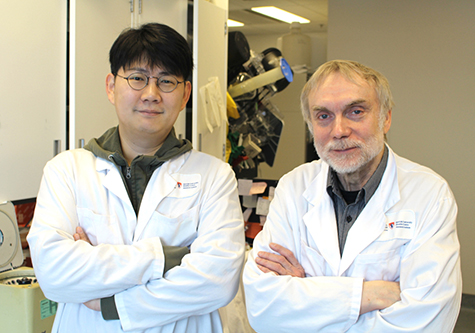
Les biopsies de tumeurs pour diagnostiquer le cancer et suivre le traitement impliquent habituellement le retrait d’un échantillon de tissu, mais ce processus prélève du matériel d’une petite portion de la tumeur sans garantir qu’elle comporte l’information la plus importante. Inversement, les biopsies liquides à l’aide de tests sanguins permettent au médecin de prélever du matériel de la tumeur entière d’une manière plus rapide et considérablement moins intrusive qu’une biopsie traditionnelle.
Les cellules libèrent des vésicules extracellulaires dans le sang à un rythme régulier. Ces vésicules, en particulier les exosomes, agissent comme médiateurs de la communication intercellulaire et transportent une cargaison de protéines ou d’acides nucléiques. Les cellules cancéreuses libèrent également des exosomes uniques, chacun d’entre eux étant un représentant de la cellule d’où il provient.
« Les exosomes entrent dans le sang par toutes les cellules dans la tumeur. Par conséquent, avec des méthodes de détection suffisamment sensibles, nous pouvons suivre les mutations dans le cancer, donnant ainsi à ces exosomes un potentiel diagnostique », dit le Dr Janusz Rak, scientifique senior dans le Programme en santé de l’enfant et du développement humain. « Nous atteignons le stade dans la caractérisation moléculaire des cancers où ces caractéristiques pourraient être utilisées pour prendre des décisions cliniques. »
La recherche explore les façons de comprendre l’information déposée dans la circulation sanguine par le cancer. « Nous identifions des “signatures” dans cette information génétique afin que nous puissions déterminer ce qu’une tumeur fait », dit le Dr Peter Metrakos, chef du Programme de recherche sur le cancer. « Si les mutations diminuent, nous saurons ainsi que notre traitement fonctionne. »

Une vision pour la nanomédecine appliquée
Les Drs Rak et Metrakos sont co-responsables d’une demande à la Fondation canadienne pour l’innovation pour établir un Centre de nanomédecine appliquée à l’IR-CUSM. « Ce centre offrirait un soutien à notre recherche sur ces vésicules dans le diagnostic ainsi que dans d’autres contextes, dit le Dr Rak. Les biopsies liquides ont une capacité inépuisable de refléter cette maladie maligne changeante qui touche les gens. »
ÉTUDIER LES PROFILS GÉNÉTIQUES DES PATIENTS ATTEINTS DU CANCER
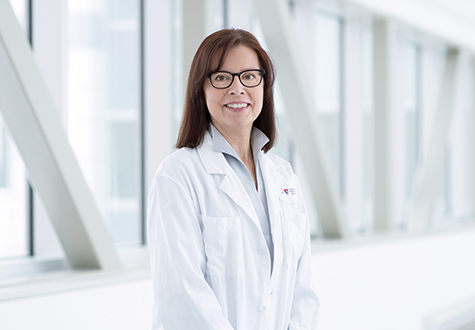
Il est connu que la constitution génétique influence le risque de cancer d’une personne. Par exemple, alors que moins d’un pour cent des femmes développeront un cancer de l’ovaire, celles porteuses d’une mutation précise ont un risque de quarante à soixante pour cent. Il est important pour la personne et pour le médecin de connaître la constitution génétique de chaque patient et de choisir la meilleure thérapie.
Faites place à Oncodrive, un projet mené par Patricia Tonin (Ph. D.), chef associée du Programme de recherche sur le cancer qui fut impliquée dans la découverte de plusieurs mutations génétiques prédisant la susceptibilité à développer de nouvelles maladies. « Oncodrive vise à améliorer la gestion des patients atteints du cancer en dérivant la séquence génétique d’un individu, explique-t-elle. Plusieurs mutations génétiques affectent sensiblement le risque, et cette information devrait être fournie aux personnes porteuses de ces mutations ainsi qu’à leur médecin. De plus, certaines mutations génétiques peuvent affecter la réponse d’un patient à des thérapies précises, ce qui influence ensuite le choix de traitement. »
Grâce aux bases de données d’Oncodrive, les médecins auront accès au profil génétique du patient et pourront adapter le traitement en conséquence, en utilisant des thérapies plus agressives pour les patients dont les gènes suggèrent une susceptibilité aux cancers agressifs. Les chercheurs se fonderont également sur les bases de données pour identifier d’autres mutations pouvant contribuer aux probabilités d’un patient de développer un cancer.
Commencer par les patientes du CUSM atteintes du cancer du sein
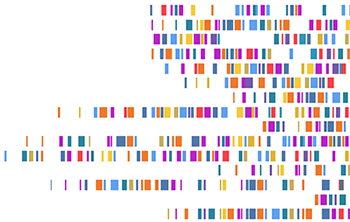
Oncodrive se concentrera initialement sur la collecte d’informations génétiques de patientes atteintes du cancer du sein au CUSM. « Les femmes atteintes du cancer du sein ont tendance à être conscientes du rôle des mutations génétiques et des utilisations du dépistage génétique et sont probablement davantage prêtes à observer le reste du génome pour voir quels autres facteurs pourraient contribuer à leur risque ou affecter leur traitement », dit Patricia Tonin.
PROCHAINS ARTICLES
ARTICLE PRÉCÉDENT

